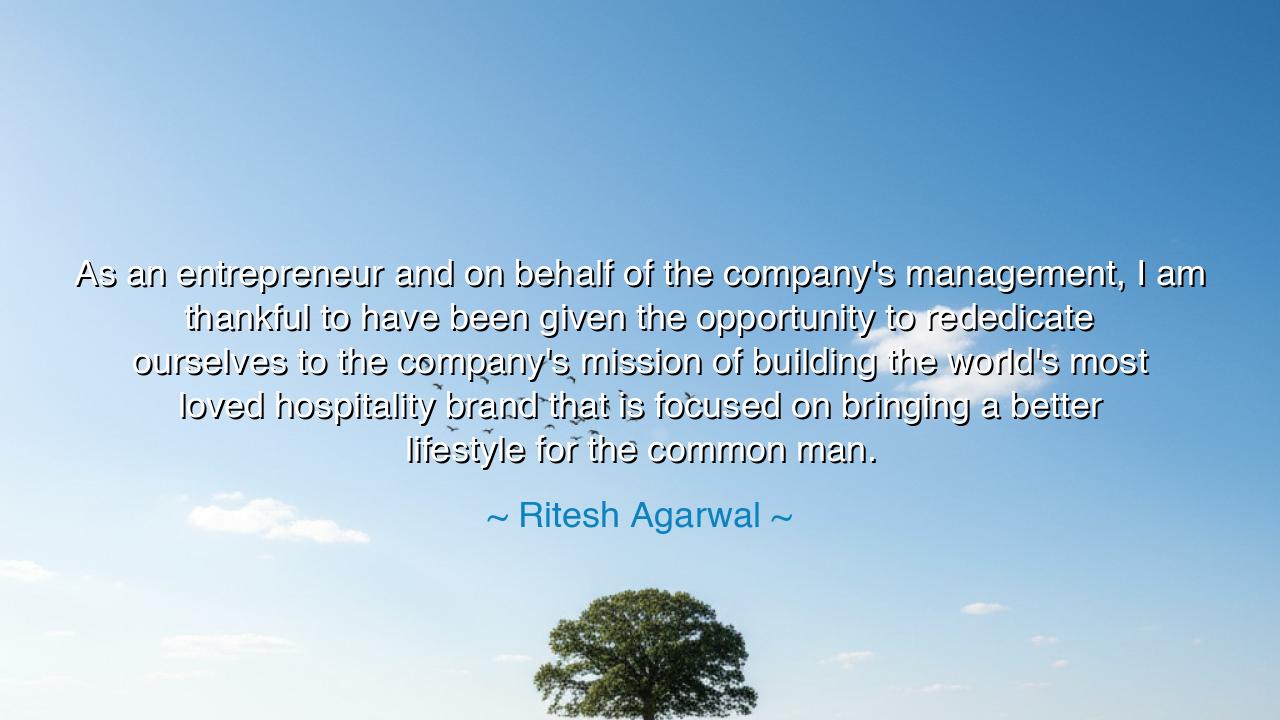
As an entrepreneur and on behalf of the company's management, I
As an entrepreneur and on behalf of the company's management, I am thankful to have been given the opportunity to rededicate ourselves to the company's mission of building the world's most loved hospitality brand that is focused on bringing a better lifestyle for the common man.






Ritesh Agarwal once spoke with the vision of a builder and the humility of a servant-leader: “As an entrepreneur and on behalf of the company’s management, I am thankful to have been given the opportunity to rededicate ourselves to the company’s mission of building the world’s most loved hospitality brand that is focused on bringing a better lifestyle for the common man.” These words, though modern in their form, ring with the tone of ancient vows. For they remind us that true leadership is not the pursuit of riches alone, but the consecration of one’s gifts and one’s company to the service of others.
The ancients revered the idea of the mission—that men and women must tether their lives not only to personal desires, but to a greater purpose. Alexander sought to unite the world under one rule; Ashoka, after conquest, sought to spread peace and dharma; Florence Nightingale sought to bring dignity to the wounded and the forgotten. In each of these, as in Agarwal’s words, we see the pattern of leadership renewed: a sense of calling, a thankfulness for the chance to pursue it, and the resolve to align one’s work with a vision larger than oneself.
The heart of this statement lies in the acknowledgment of the common man. Too often, enterprises rise and fall because they lose sight of the many whose lives form the foundation of society. Agarwal’s words carry echoes of the prophets and sages who reminded rulers that greatness is not found in palaces alone, but in the welfare of the people. The hospitality brand he envisions is not only for the elite, but for the multitude—for the weary traveler, the family seeking dignity, the worker longing for rest. To be thankful for the chance to serve them is to recognize the sacredness of service itself.
History gives us many mirrors of this truth. Consider Andrew Carnegie, who, after building one of the greatest fortunes in history, declared that the true duty of wealth was to uplift the lives of ordinary people. He built libraries, schools, and institutions so that knowledge and opportunity would reach the common man. Similarly, Agarwal speaks not of pride in profit, but of gratitude for opportunity—the chance to rededicate himself and his company to the noble purpose of improving lives.
His words also remind us of the cyclical nature of dedication. He does not speak of a mission fulfilled once and for all, but of the need to rededicate. This is the rhythm of life and leadership: to renew one’s vow, to realign one’s path, to refresh one’s vision when the burdens of the world threaten to dull it. Just as monks renew their prayers daily, just as nations recommit themselves to their founding ideals, so too must leaders and companies pause to remember why they began and to recommit themselves to their true purpose.
The deeper meaning is this: gratitude and vision are the twin pillars of enduring greatness. Gratitude keeps the leader humble, remembering that opportunity is a gift and not a possession. Vision keeps the leader focused, remembering that the path of business, like the path of kingdoms, must be aligned with service, not self-indulgence. When these are joined together, even ordinary endeavors take on the quality of the eternal.
The lesson for us is clear. Whatever role we hold—be it entrepreneur, worker, teacher, or parent—we must never forget to rededicate ourselves to the mission that gives our labor meaning. We must remain thankful for the chances we have been given, however small, for even the smallest opportunity can become the seed of greatness. And we must remember always to serve, not only the powerful, but the common man, for in serving them, we touch the very heart of humanity.
Practical counsel may be drawn. Begin by writing down your mission, whether for your life, your work, or your family, and revisit it often. When fatigue and distraction come, pause and rededicate yourself. Practice gratitude daily, not only for victories but for the simple gift of being entrusted with responsibility. And finally, ensure that your work, whatever it may be, brings some measure of dignity and betterment to others. In this way, like Ritesh Agarwal, you too may live with vision and leave behind a legacy of service and honor.






AAdministratorAdministrator
Welcome, honored guests. Please leave a comment, we will respond soon